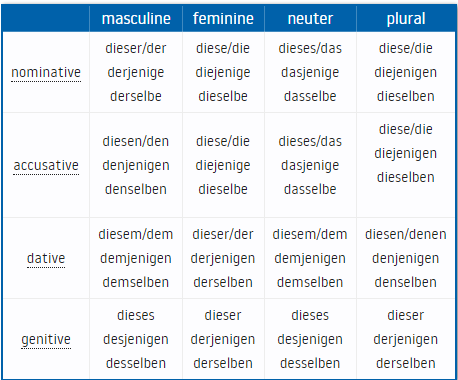Demonstrative Pronouns in German Grammar

Demonstrative pronouns in German Grammar, also indicative pronouns, can replace previously mentioned nouns in a sentence. We use them to emphasise or distinguish something like this/that, these/those in English Grammar. In German grammar, demonstrative pronouns are declined to reflect case, gender and number. A different form is often prefered in spoken German.
Demonstrative Pronouns in German Grammar
We use them to emphasise or distinguish something like this/that, these/those in English Grammar.
Dieser/Jener
Use dieser/diese/dieses and jener/jene/jenes to choose something specific out of a group.
- Example: Welches Auto möchten Sie kaufen, dieses oder jenes?
- Welches Kleid soll ich anziehen? – Dieses
In spoken language, German speakers generally prefer to use der/die/das da or der/die/das dort instead of jener/jene/jenes,
- Example: Möchten Sie diese Schuhe anprobieren? – Nein, lieber die dort.
Der/Derjeniger/Derselber
Use der/die/das, as well as derjenige/diejenige(n) or derselbe/dieselbe/dasselbe to emphasise something.
- Example: Wer ist der Junge? – Das weiß ich nicht. Den kenne ich nicht
- Derjenige, der das Rätsel zuerst löst, bekommt einen Preis.
- Hat sie einen neuen Freund? – Nein, es ist derselbe wie neulich.
The demonstrative pronouns der/die/das are declined in the same ways as relative pronouns. Pay attention to the dative plural.
- Example: Wie geht es Jan und Linda? – Keine Ahnung, von denen habe ich lange nichts gehört.
Demonstrative Adjectives and Nouns
We can also use demonstrative pronouns in front of nouns. In this case, they differentiate themselves from normal articles by emphasising something specific. Therefore, we also emphasise the demonstrative pronoun when speaking.
- Example: Mit der Kleidung kommst du nicht in den Club!
-
*With a different outfit, you could get into this club; and maybe with this outfit you could get into another club, but not with this outfit in this club.
Declension Table: Demonstrative Pronouns
The table provides a simple overview of the declension of masculine, feminine, neuter and plural demonstrative pronouns in nominative, accusative, dative and genitive.

Possessive Pronouns
|
|
|
||
|
the glasses
|
|||
|
He has forgotten his glasses.
|
|||
|
Where has he left his glasses?
|
|||
|
|
|
|
|
|
the clock
|
|||
|
His clock isn’t working.
|
|||
|
The clock hangs on the wall.
|
|||
|
|
|
|
|
|
the passport
|
|||
|
He has lost his passport.
|
|||
|
Where is his passport then?
|
|||
|
|
|
|
|
|
they – their
|
|||
|
The children cannot find their parents.
|
|||
|
Here come their parents!
|
|||
|
|
|
|
|
|
you – your
|
|||
|
How was your trip, Mr. Miller?
|
|||
|
Where is your wife, Mr. Miller?
|
|||
|
|
|
|
|
|
you – your
|
|||
|
How was your trip, Mrs. Smith?
|
|||
|
Where is your husband, Mrs. Smith?
|
|||
|
|
|
|
|
Then at last you can Improve your German with Learning German App. where you can practise according to your level. practice your German Grammar and Language online. We hope that you have got demonstrative pronouns in German Grammar well.




























